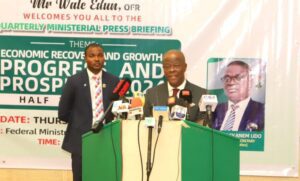
Banks to accept old naira notes after deadline — CBN
…As Emefiele appear before House of Representative
…as money supply in Nigeria rose to N52.14 trillion in 2022 despite policies
By Seun Ibiyemi
Sequel to the February 10 deadline for withdrawal of old notes, the Governor of the Central Bank of Nigeria (CBN), Godwin Emefiele, has disclosed that banks will continue to accept old naira notes.
Emefiele revealed this on Tuesday while speaking at an interactive session with the House of Representatives ad hoc committee on the currency redesign and naira swap policy.
He said the CBN will also accept the old naira notes from banks after the February 10 deadline.
The apex bank boss made reference to the CBN act which mandates the apex bank to continue to accept old notes after its expiration but did not mention a duration when the banks will stop collecting the old notes.
Section 20 (3) of the CBN act states: “Notwithstanding sub-sections (1) and (2) of this section, the bank shall have power, if directed to do so by the president and after giving reasonable notice in that behalf, to call in any of its notes or coins on payment of the face value thereof and any note or coin with respect to which a notice has been given under this sub-section, shall, on the expiration of the notice, cease to be legal tender, but, subject to section 22 of this act, shall be redeemed by the bank upon demand.”
Speaking further on the CBN act, he explained that even after the old currency has lost its legal tender status “we (CBN) are mandated to collect these money (old notes) and I stand with the House of Representatives on this.”
Emefiele added, “What does that mean? It could (old notes) have lost its legal tender status which means we have moved on. But if you have your money that you have not been able to send to the bank, we will certainly give you the opportunity to bring them back into the CBN to redeem it. Either you pay it to your bank account or you want to do exchange, we will give you. You will not lose your money. This is the assurance I give to Nigerians.”
Recall that the Speaker of the House of Representatives, Rt Hon. Femi Gbajabiamila, had declared that a warrant of arrest would be issued against Godwin Emefiele if he failed to appear before the committee.
The House threatened to invoke the provisions of section 89(1)(d) of the Constitution by issuing a warrant of arrest today to compel him to appear.
Emefiele, who was supposed to appear before the Committee last week, failed to do, stating he was out of the country with President Muhammadu Buhari.
The House had set up an ad hoc committee to investigate the scarcity of the new naira at the Deposit Money Banks, also known as commercial banks, leading to tension over the January 31 deadline for the exchange of the old notes with the newly designed ones among other reasons.
Although the CBN, on Sunday, extended the deadline on the expiration of the old N1,000, N500 and N200 noted by 10 days – from January 31 to February 10, with the Deposit Money Banks (commercial banks) allowed to accept the notes by seven days more, the House had insisted on Emefiele’s appearance.
Emefiele who appeared with some of his assistants, went into a brief Executive session with members of the committee.
Money supply in Nigeria rose to N52.14 trillion in 2022 despite policies
However, despite many moves by the CBN to mop up liquidity in the Nigerian economy last year, the nation’s money supply still rose to an all-time high of N52.14 trillion.
According to data from the apex bank, Nigeria’s money supply gained a massive N8.32 trillion in the review year after jumping from N43.82 trillion in 2021. This indicates an increase of 19 per cent year-on-year.
Nigeria recorded a record-level inflation rate in 2022 triggered by the Russia-Ukraine war and the global energy crisis. In November 2022, Nigeria’s inflation rate climbed to a 17-year high of 21.47 per cent moderating albeit slightly to 21.34 per cent in the following month.
In a bid to tame the rising rate of inflation in the country, which had increased for 11 successive months, the CBN’s Monetary Policy Committee (MPC) raised the benchmark interest rate (MPR) by a collective 500 basis points to 16.5 per cent in November 2022.
The committee however followed with an additional 100 basis points increase to 17.5 per cent in January 2023.
The tightening stance of the CBN was aimed at reducing the money supply in the country and currency outside the vaults of the banks, which is believed to be fuelling the inflationary pressure. Unfortunately, the increase in money supply has remained unabated, consistently trending upward since August 2022.
The money supply, which is a function of the level of liquidity in the economy comprises net foreign assets and net domestic assets.
According to the data, net foreign assets stood at N4.25 trillion as of December 2022, an N4.56 trillion decline when compared to N8.81 trillion recorded as of the corresponding period of 2021.
On the other hand, net domestic assets rose by a whopping N12.88 trillion in the review year to stand at N47.89 trillion from N35 trillion the previous year. This implies that Nigeria’s money supply growth is driven by the surge in net domestic assets.
This is largely driven by the increase in domestic credit, which stood at N66.46 trillion as of the end of the year.
Further breakdown showed that credit to the government increased by the huge sum of N11.33 trillion to stand at N24.66 trillion, while credit to the private sector increased by N6.6 trillion to stand at N41.8 trillion in the same period.
The total currency in circulation in the Nigerian economy stood at N3.01 trillion at the end of the year, an N313.1 billion reduction compared to N3.33 trillion recorded in the previous year.
Currency outside the vaults of the banks also stood at N2.57 trillion, representing 85.2 per cent of the total currency in circulation.
In a swift response to the extension, the Chief Executive Officer of the Centre for the Promotion of Private Enterprise (CPPE), Dr Muda Yusuf, has expressed concern that the seven days added after February 10th as the deadline for the old naira notes is not enough and not possible, “it is a big joke, because the house is calling for at least extra six months for people to be able to return the money so that the pressure on people will not be much.”
He said “as at today, many banks still don’t have the new naira notes, many ATMs as well are not dispensing and we still can’t get cash over the counter so anything short of three months for people to return the old notes will not address this problem on ground. So that seven days cannot work.
Speaking on sales of new naira notes, he said “CBN has talked about corruption that the EFCC and ICPC will get involved.
“So corruption within the system is contributing to this problem because the bank officials has turned this thing to business and we are now dealing with another black market situation just as we have black market in fuel.
“We now have black market in currency exchange so it is now a business to them and it is the bank in collusion with those POS operators and those that are selling the money at event centers, those are the people in the league of this business. So the responsibility of the CBN is to go and sanitize the system because that system is within his purview.
“But to remove all this pressure and corruption the best thing is to give minimum of three months for this two currencies to exist side by side while they gradually withdraw the old ones because what is happening now is that people deposit their money in the bank but can’t get it out to do their business so they have paralyzed people’s business.
Some people that is all the working capital they have. Imagine for example somebody puts in maybe 500,000 you now ask the person to go and queue at the ATM to collect only 20,000 is that fair to such person? No it is not.
“So if they don’t have enough money, they should allow both the old notes and the new ones exist together till they gradually fix out the old naira notes or for every deposit they receive they should be able to give people back equivalent of what people deposit so that people can carry on with their business not giving them 20,000 after they deposited 500,00. what will they do with that amount especially all these our traders, the former sector people some people even travel from very far places to come to these banks.
“I feel we are just subjecting our citizens to unnecessary hardship, completely unnecessary hardship,” he said.



